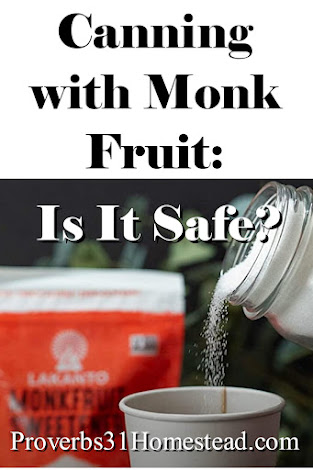This post may contain affiliate links. As an Amazon Associate, and at no cost to you, I earn from qualifying purchases made through some links. Please see FCC disclosure for full information. Thank you for supporting this site!
As many of you know, I'm a type 2 diabetic who maintains normal blood sugar through diet (no meds). So canning without sugar is something I've done a lot of research into - and have blogged about in the past.
I'm certainly not the only one who is concerned about the absurd amount of sugar the average American consumes without even realizing it. (According to conservative estimates, Americans eat 26 lbs. of sugar per year - and this doesn't even include the many carbs in the average American diet, which turn into sugar in the body.) As I typed about in this post on how sugar sneaks under the radar with tricky names, scientific studies show sugar is an underlying cause for virtually every disease, since it creates crazy inflammation in the body.
But as more and more people come to realize this, I'm seeing an unfortunate trend in canning: The use of alternative sweeteners.
Now, alternative sweeteners aren't necessarily a bad thing, especially if they are natural and minimally processed. The trouble is, most of them have not been tested safe for canning.
You may ask: Why wouldn't a sweetener tested safe for human consumption be safe for canning? Up until recently, I could only point to man-made (artificial) sweeteners, like aspartame and saccharine, where tests have shown the heat used in home canning makes the sweetener unstable - and therefore unsuitable for home canned products. But then a lot of people would respond, "Yeah, but those are fake foods. I don't see why real foods, like monk fruit, wouldn't be safe to can with." Such people do, indeed, use their sweetener of choice (often monk fruit or erythritol) in canning. This makes me cringe, because we just don't know how these sweeteners react after the boiling they'll take in the home canning process.
Well, now the Utah State University Extension has revealed a more exact reason not to use monk fruit in canning. As they explain: "The monk fruit sweetener chemicals are extracted from the monk fruit and then blended with something to bulk it up. Each product might be different regarding pH and what is called the pH buffering capacity. Currently there are no pH tests published for canning with monk fruit, and the recommendation is to avoid the use of monk fruit in canning at this time."











What about Pomona Pectin and monkfruit?
ReplyDeleteThe scientists still say to avoid it, because of the issues mentioned in the article. (Sorry for the delay in answering; I was having technical difficulties!)
Delete